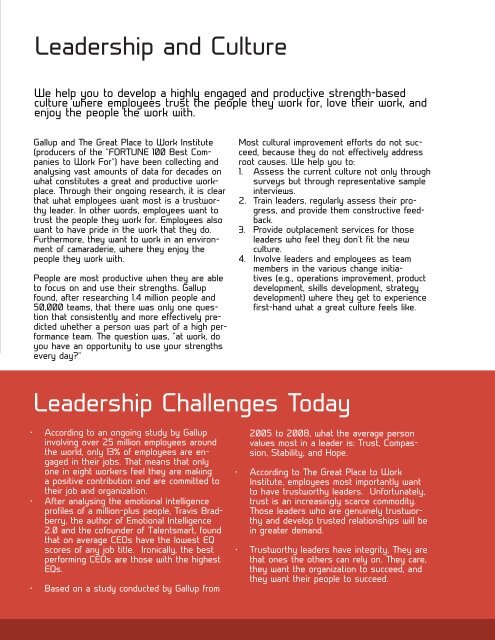Helping You to Create the Most Productive and Engaged Organization in the World.
You also want an ePaper? Increase the reach of your titles
YUMPU automatically turns print PDFs into web optimized ePapers that Google loves.
Leadership <strong>and</strong> Culture<br />
Overview of Projects<br />
We help you <strong>to</strong> develop a highly engaged <strong>and</strong> productive strength-based<br />
culture where employees trust <strong>the</strong> people <strong>the</strong>y work for, love <strong>the</strong>ir work, <strong>and</strong><br />
enjoy <strong>the</strong> people <strong>the</strong> work with.<br />
Gallup <strong>and</strong> The Great Place <strong>to</strong> Work Institute<br />
(producers of <strong>the</strong> “FORTUNE 100 Best Companies<br />
<strong>to</strong> Work For”) have been collect<strong>in</strong>g <strong>and</strong><br />
analys<strong>in</strong>g vast amounts of data for decades on<br />
what constitutes a great <strong>and</strong> productive workplace.<br />
Through <strong>the</strong>ir ongo<strong>in</strong>g research, it is clear<br />
that what employees want most is a trustworthy<br />
leader. In o<strong>the</strong>r words, employees want <strong>to</strong><br />
trust <strong>the</strong> people <strong>the</strong>y work for. Employees also<br />
want <strong>to</strong> have pride <strong>in</strong> <strong>the</strong> work that <strong>the</strong>y do.<br />
Fur<strong>the</strong>rmore, <strong>the</strong>y want <strong>to</strong> work <strong>in</strong> an environment<br />
of camaraderie, where <strong>the</strong>y enjoy <strong>the</strong><br />
people <strong>the</strong>y work with.<br />
People are most productive when <strong>the</strong>y are able<br />
<strong>to</strong> focus on <strong>and</strong> use <strong>the</strong>ir strengths. Gallup<br />
found, after research<strong>in</strong>g 1.4 million people <strong>and</strong><br />
50,000 teams, that <strong>the</strong>re was only one question<br />
that consistently <strong>and</strong> more effectively predicted<br />
whe<strong>the</strong>r a person was part of a high performance<br />
team. The question was, “at work, do<br />
you have an opportunity <strong>to</strong> use your strengths<br />
every day?”<br />
<strong>Most</strong> cultural improvement efforts do not succeed,<br />
because <strong>the</strong>y do not effectively address<br />
root causes. We help you <strong>to</strong>:<br />
1. Assess <strong>the</strong> current culture not only through<br />
surveys but through representative sample<br />
<strong>in</strong>terviews.<br />
2. Tra<strong>in</strong> leaders, regularly assess <strong>the</strong>ir progress,<br />
<strong>and</strong> provide <strong>the</strong>m constructive feedback.<br />
3. Provide outplacement services for those<br />
leaders who feel <strong>the</strong>y don’t fit <strong>the</strong> new<br />
culture.<br />
4. Involve leaders <strong>and</strong> employees as team<br />
members <strong>in</strong> <strong>the</strong> various change <strong>in</strong>itiatives<br />
(e.g., operations improvement, product<br />
development, skills development, strategy<br />
development) where <strong>the</strong>y get <strong>to</strong> experience<br />
first-h<strong>and</strong> what a great culture feels like.<br />
Leadership Challenges Today<br />
• Accord<strong>in</strong>g <strong>to</strong> an ongo<strong>in</strong>g study by Gallup<br />
<strong>in</strong>volv<strong>in</strong>g over 25 million employees around<br />
<strong>the</strong> world, only 13% of employees are engaged<br />
<strong>in</strong> <strong>the</strong>ir jobs. That means that only<br />
one <strong>in</strong> eight workers feel <strong>the</strong>y are mak<strong>in</strong>g<br />
a positive contribution <strong>and</strong> are committed <strong>to</strong><br />
<strong>the</strong>ir job <strong>and</strong> organization.<br />
• After analys<strong>in</strong>g <strong>the</strong> emotional <strong>in</strong>telligence<br />
profiles of a million-plus people, Travis Bradberry,<br />
<strong>the</strong> author of Emotional Intelligence<br />
2.0 <strong>and</strong> <strong>the</strong> cofounder of Talentsmart, found<br />
that on average CEOs have <strong>the</strong> lowest EQ<br />
scores of any job title. Ironically, <strong>the</strong> best<br />
perform<strong>in</strong>g CEOs are those with <strong>the</strong> highest<br />
EQs.<br />
• Based on a study conducted by Gallup from<br />
2005 <strong>to</strong> 2008, what <strong>the</strong> average person<br />
values most <strong>in</strong> a leader is: Trust, Compassion,<br />
Stability, <strong>and</strong> Hope.<br />
• Accord<strong>in</strong>g <strong>to</strong> The Great Place <strong>to</strong> Work<br />
Institute, employees most importantly want<br />
<strong>to</strong> have trustworthy leaders. Unfortunately,<br />
trust is an <strong>in</strong>creas<strong>in</strong>gly scarce commodity.<br />
Those leaders who are genu<strong>in</strong>ely trustworthy<br />
<strong>and</strong> develop trusted relationships will be<br />
<strong>in</strong> greater dem<strong>and</strong>.<br />
• Trustworthy leaders have <strong>in</strong>tegrity. They are<br />
that ones <strong>the</strong> o<strong>the</strong>rs can rely on. They care,<br />
<strong>the</strong>y want <strong>the</strong> organization <strong>to</strong> succeed, <strong>and</strong><br />
<strong>the</strong>y want <strong>the</strong>ir people <strong>to</strong> succeed.


